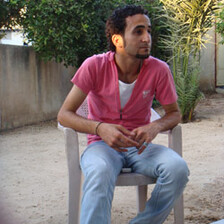
AP Photo/Nasser Ishtayeh
Most Palestinian students woke up this morning very early. They prepared themselves and left their homes and families to undertake a journey with final destination their school. They have to walk for long hours, taking short cuts, such as from the village of Salem to reach the Palestinian town of Nablus (see picture) to reach their examination rooms, not knowing what to expect on their way.
‘I am not going to the university’, says Ashraf, a friend from Ramallah who works at Birzeit University. ‘What I saw yesterday at Surda was not something I want experience again’, he continues, referring to occasional shootings and harassment of Palestinian commuters at the Surda checkpoint, which is located between Ramallah and Birzeit. I called my family in Ramallah two days ago. ‘Why don’t you come over and have dinner with us?’ my aunt asks me. ‘Perhaps it is better to wait until Qalandia is quiet’, she quickly changed. That morning, there was also a shooting at the Qalandia checkpoint. Soldiers, eventhough they don’t have final exams to do, are nervous and frequently shoot and scare commuters, waiting in line to show their identity cards.
To be a Palestinian student is difficult these days. Also teachers and university staff and others who have to travel for long hours, without the knowledge if they will finally reach their schools and universities, face difficulties and obstacles, excluding the fear of passing checkpoints, bypassing tanks and other military equipment sent to this region with American support.
If you’re not arrested, detained, wounded or disabled, you still have the burden of the occupation waiting for you before you can show your teachers what you were able to study and learn during this year of Israeli invasions, destructions, curfews, home demolitions, extra-judicial killings, shellings, torture, armored personnel carriers, degrading treatments, humiliation, harassment, siege, shootings, abuse, Apache helicopters, and most severely, the loss of hope and light at the end of this dark tunnel.
If you’re detained and arrested for your opposition against the occupation, or your resistance against apartheid, or plainly, because you’re Palestinian, then you are allowed to do your final exams. Fortunately, Aazem, a lawyer and friend, managed to file a pre-petition at the Israeli Supreme Court and succeeded the judge to agree that Palestinian students who have been detained in Israel’s latest arbitrary mass arrest campaign, or plainly ‘the defensive wall razzia’, should be allowed to do their examination in the detention and interrogation, or plainly ‘the torture’ centers where they are held. The judge also agreed that they must have access to study books.
The problem, however, is whether you were able to concentrate and study. How could you when you’re detained in a place which doesn’t even meet the minimum rules for the treatment of prisoners, violates civil and political rights, and which doesn’t protect you against torture and other cruel, inhuman or degrading treatment or punishment.
I remembered that I always needed some quiet space to study for my exams. I don’t think someone can really concentrate in severe overcrowded places such as the Israeli detention and interrogation centers, in particular if you see the suffering of your fellow detainees, who are plagued by lack of medical care, guard abuse. Eventhough the general public might be concerned with the prisoners who have been locked up, they are less concerned about the conditions in which these detainees were confined.
Two years ago, in May 2002, close to one thousand Palestinian detainees participated in a month-long hunger strike, protesting arbitrary treatment by prison officials, substandard prison conditions, prohibitions on family visits, use of solitary confinement, poor medical care, and Israel’s refusal to release all political prisoners. An Israeli government report in June 2000 on conditions in the Shatta prison, described the living conditions as ‘particularly harsh’ in the wing where Palestinian prisoners from the Occupied Palestinian Territories were held, and concluded that the exposed tents used to house Palestinian prisoners and filthy bathrooms at the prison were unfit for human use. Since the beginning of the intifada, these conditions have become increasingly worse. ‘Unfit for human use’ has become ‘unfit for animal use’.
Let’s suppose you’re not detained or imprisoned and still you need to do your exams in order to continue your education. You would thank whatever or whoever you believe in for helping and protecting you on your way to the final examinations. If the test was about ‘living under occupation’, ‘human rights’, ‘humanitarian law’ you probably got an ‘A’ without studying. In these terms you would have the hard lesson of human rights. Without knowing the thirty articles of the Universal Declaration you know exactly when you’re rights are violated, you can feel it physically and mentally.
Others would tell you that you would score points on tests of ‘hatred’ and ‘incitement’. What they forgot to tell you is that the students learn the ‘hatred’ on their way to school, crossing humiliating checkpoints, experiencing life under military dictatorship and occupation, watching their parents in fear when Apache helicopters fly over and looking at blindfolded and handcuffed men marching through the streets at point blank. They are the ones who are ‘incited’ by that same soldier, pointing his gun at you, while he waves to you to step forward.
What will happen to these kids? What kind of future lies ahead of them, even if they manage to graduate from highschool? Will they become doctors and lawyers?
The picture above shows Palestinian students taking a short cut from the village of Salem to the Palestinian town of Nablus (AP Photo/Nasser Ishtayeh)




